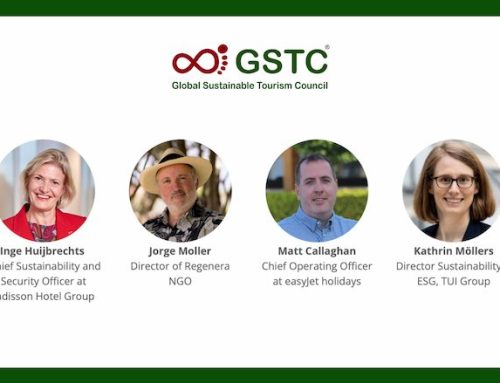Planet Happiness and the Global Sustainable Tourism Council (GSTC) have signed a partnership agreement focused on strengthening sustainability standards in tourism and impact reporting in tourism destinations.
They will work together to promote mutual understanding of each other’s work among their members and partners. They will also engage on a range of topics related to the adoption of sustainability standards, especially in destination planning and sustainability reporting.
In an age where overtourism is of growing concern, Planet Happiness aims to show that measuring host well-being in tourism destinations is as important as counting Gross Domestic Product, profits, income and visitor numbers. It also provides a more rounded, inclusive and assured pathway to destination sustainability.
The Happiness Index survey, promoted by Planet Happiness is currently available in 21 languages. It includes indicators for satisfaction with life, access to nature and arts, community engagement, standard of living, life-long learning and health.
The GSTC establishes and manages global sustainable standards, known as the GSTC Criteria: Destination Criteria for public policy-makers and destination managers, and Industry Criteria for hotels and tour operators. These are the guiding principles and minimum requirements that any tourism business or destination should aspire to reach, to protect and sustain the world’s natural and cultural resources, while ensuring tourism meets its potential as a tool for conservation and poverty alleviation. The GSTC also acts as the international accreditation body for sustainable tourism certification.
The two organisations signed a Memorandum of Understanding (MOU) earlier this month. It provides a framework for Planet Happiness to promote GSTC criteria in its project sites around the world. The MOU also determines how measuring host happiness and well-being can contribute towards destination sustainability.
“With the MOU Planet Happiness will promote its happiness and well-being agenda among GSTC members,” said Dr Paul Rogers, the Co-Founder and Director of Planet Happiness, a project of the Happiness Alliance, a non-profit organisation with eight years’ experience in happiness and well-being measurements.
“The Happiness Index survey is perhaps the best, most progressive, adaptable and easy to use Happiness survey on the planet. Its use allows destinations to engage host communities more directly in tourism planning,” said Rogers.
On signing the MOU, Randy Durband, CEO of GSTC, said that the long-term viability of tourism sites depended on the industry’s ability to improve the quality of life of host communities and engage local people more directly in tourism development issues.
The Planet Happiness and GSTC partnership aims to ensure tourism is developed to strengthen destination well-being. It will deliver win-wins for host communities, governments, businesses and tourists, especially discerning visitors seeking a greater level of connection with their hosts.
Rogers said that the signing of the MOU with GSTC will spread international awareness of the innovative approach of including destination well-being in tourism destination planning.
“Planet Happiness looks forward to embracing more partners and to providing governments, universities and travel industry players around the world with the model and survey tools to measure, track and strengthen destination wellbeing,” said Rogers.
«Social issues are of course integral in the GSTC Criteria, as are Sustainable Management elements that call for genuine public participation and consideration of community needs in tourism development and execution. We therefore welcome the addition to our membership the Planet Happiness team that is putting great focus on many aspects of the community and social side of sustainable tourism», says Randy Durband, GSTC CEO.
About GSTC
The Global Sustainable Tourism Council (GSTC) establishes and manages global sustainable standards, known as the GSTC Criteria. There are two sets: Destination Criteria for public policy-makers and destination managers, and Industry Criteria for hotels and tour operators. These are the guiding principles and minimum requirements that any tourism business or destination should aspire to reach in order to protect and sustain the world’s natural and cultural resources, while ensuring tourism meets its potential as a tool for conservation and poverty alleviation. The GSTC Criteria form the foundation for GSTC’s role as the global Accreditation Body for Certification Programs that certify hotels/accommodations, tour operators, and destinations as having sustainable policies and practices in place. GSTC does not directly certify any products or services; but it accredits those that do. The GSTC is an independent and neutral USA-registered 501(c)3 non-profit organization that represents a diverse and global membership, including NGO’s, national and provincial governments, leading travel companies, hotels, tour operators, individuals and communities – all striving to achieve best practices in sustainable tourism. Information for media and the press.
About Happiness Alliance
Since 2010 the Happiness Alliance has provided tools and resources for the Happiness & Wellbeing Movement including the Happiness Index. Laura Musikanski is executive director the Happiness Alliance a non-profit body. Laura has authored multiple books & articles and is co-author of the Happiness Policy Handbook. She is also a lawyer with an MBA & certificates in environmental management & law from the University of Washington.
About Planet Happiness
Planet Happiness is a grass-roots big data project to introduce Gross National Happiness, wellbeing & more to local communities, governments at all levels and businesses. Its target audiences and collaborators are individuals, local communities, businesses and governments connected to the travel and tourism industry. Dr Paul Rogers is the co-founder and director of Planet Happiness. He has over 20 years’ experience as a tourism advisor to national and local governments and has worked in more than a dozen countries in Asia, Africa and Australia.





